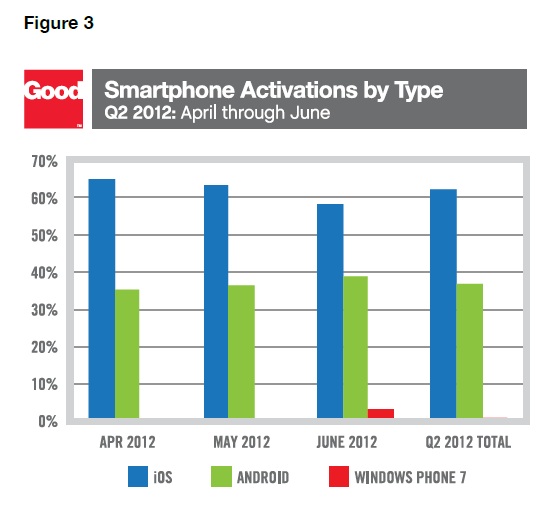You’ll get no shortage of half-baked theories here at UberMobile. Here’s one where I argue that Chinese consumers and global enterprises are to blame for the blip in iPhone sales, but maybe not in the way you expect.
Let’s keep a little perspective. Apple still sold 26 million iPhones in its fiscal Q3, up 28% year-over-year, worth $16.2 billion, up 22% year-over-year. The strongest challenger to the iPhone, Samsung’s Galaxy S III smartphone, has been sold 10 million times two months after launch, but that was after months of pent-up demand and stellar reviews.
The normally overexcitable stock market is certainly keeping its collective head. As of mid-day, Apple’s stock is only down 5% on above-average trading. You’d think after what you read on Techmeme yesterday that AAPL would look like this:

China Syndrome
Some are blaming Europe for iPhone weakness. But if you’re going to point to a region, point to China, where sales fell 28% to $5.7 billion in Q3 from $7.9 billion in Q2.
People forget that Apple hugely ramped up iPhone sales in China at the beginning of the year. It launched the iPhone 4S at Apple Stores in Beijing and Shanghai in January. January/February is when Chinese New Year occurs, when workers get their annual bonus (usually at least several months worth of pay) plus several weeks of vacation. It’s really the closest equivalent to Christmas, with lots of gift giving. And what better gift for a young urbanite than an iPhone?
Also, Apple officially began offering iPhones via a second carrier partner, China Mobile, at the end of Q2. With 129 million subscribers on its CDMA network, China Mobile is like the U.S.’s Verizon. As a result, its iPhone shipments in China in fiscal Q2 were up 5x year-over-year. Yes, 500%. And don’t forget that China is Apple’s second largest market in the world.
The net is that Apple’s iPhone comparables for Q3 vs. Q2 in China were impossible to match. But few analysts seemed to notice the China situation, despite Tim Cook openly talking about it.
Virtually, all of the $2.2 billion sequential revenue decline, was due to iPhone sales in Greater China and about half of that $2.2 billion is attributable to changes in the channel inventory not the underlying sell through of the iPhone.
No, let’s blame the euro crisis or the housing market or Obama/the Fed because that’s trendier.
Enterprise Savvy
For my other argument, I’m going out a little on a limb, using circumstantial evidence, albeit what I consider strong evidence.
There is no doubt that enterprises are buying up iPhones. Not being brought in by BYOD – that’s more of a tablet/iPad phenom – but being bought up by IT and deployed as a standard device, often replacing BlackBerries.
For instance, Good Technology reported today that among users of its MDM software, the iPhone dominated Android, with 62% share vs. Android’s 37% share of smartphones.
Or as Cook said:
We estimate that the number of iPhones in the Fortune 500 has more than doubled in the past year…PepsiCo has deployed thousands of iPhones with an in-house app build specifically for their field merchandisers. This app has eliminated paper reports and provides real-time information to managers, sales teams and delivery drivers.
German insurance provider ERGO has built an in-house app for iPhone that thousands of agents use to process insurance claims, which has significantly reduced paper work and improved processing time and customer satisfaction.
The good thing about enterprise deployments is that they are huge. The bad thing is that CIOs and IT managers are savvier than your average consumer (slap yourself on the back if you’re in IT). You know exactly when smartphones are introduced, and the effect of timing on refresh cycles and Total Cost of Ownership (TCO). And you are plugged into the rumor mill about the iPhone 5, as evidenced by your reading this and other blogs.
It doesn’t take that many Fortune 500 CIOs to wait for the iPhone 5 to cause enterprise iPhone sales to become unfavorably “lumpy” for Apple. If this is a significant factor, I don’t think Apple would admit to it, as it would show a crack in the façade of broad enterprise embrace of the iPhone.
Any readers working in IT who want to confirm or disconfirm that this entered into your decisionmaking about whether or not to deploy iPhones this quarter?
Still, I think the broad narrative holds true – enterprises are still embracing the iPhone. But as it becomes a significant segment for Apple, expect Apple to experience more seasonality in sales as enterprises try to time their buying and refresh cycles to gain maximum TCO.
